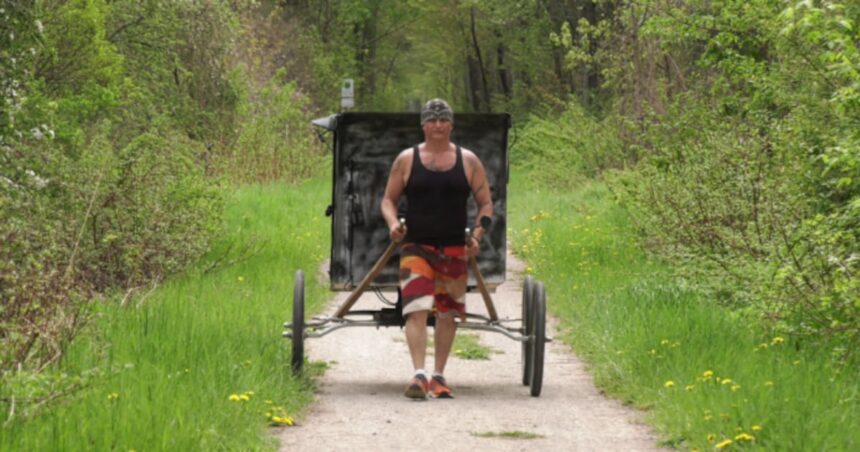I still remember when Reece Mckinnon first called me about his audacious plan. “Daniel, I’m walking across Canada,” he said plainly, as if describing a trip to the corner store. Today, as spring sunshine breaks through in Goderich, Ontario, the 34-year-old mental health advocate sets out on the first steps of his 8,000-kilometer journey across our vast country.
McKinnon launched his “Steps for Minds” campaign this morning from the shores of Lake Huron, where a small crowd of supporters gathered despite the cool morning air. His goal? To traverse Canada on foot while raising awareness for mental health resources and collecting funds for community support programs.
“Every step represents someone struggling in silence,” McKinnon told me, adjusting the straps of his pack emblazoned with mental health resource information. “When my brother died by suicide three years ago, I learned firsthand how broken our support systems can be. This walk isn’t just for him—it’s for everyone who’s fighting that invisible battle.”
The statistics driving McKinnon’s journey are sobering. According to the Centre for Addiction and Mental Health, one in five Canadians experiences mental illness in any given year, yet many communities—particularly rural ones—face significant barriers to accessing care. The Canadian Mental Health Association reports waiting lists for specialized services can stretch beyond 12 months in some provinces.
McKinnon plans to follow the Trans-Canada Highway eastward through southern Ontario before turning west toward British Columbia, stopping in communities along the way to host informal gatherings where people can share their mental health stories.
Provincial Health Minister Sylvia Jones acknowledged McKinnon’s journey in a statement yesterday: “Grassroots advocacy efforts like Mr. McKinnon’s walk help illuminate the critical need for continued investment in mental health services across Ontario and beyond.”
The campaign has already garnered support from several mental health organizations, including Mindful Mechanics, a Goderich-based peer support network that helped coordinate today’s launch. Their executive director, Alisha Thomson, emphasized how initiatives like this resonate differently than institutional campaigns.
“When someone commits to walking across the country, people listen in a way they might not to another government announcement,” Thomson said as volunteers distributed information packets to onlookers. “Reece is creating spaces for conversation in communities that might otherwise never have these discussions openly.”
What strikes me most about McKinnon’s approach is how it bridges the often disconnected worlds of policy and lived experience. After covering countless budget announcements and mental health strategies from Parliament Hill, I’ve seen how easily political promises can become detached from ground-level realities.
McKinnon seems determined to forge those connections. His route deliberately includes stops at provincial legislatures, where he plans to meet with elected officials to discuss regional challenges in mental health service delivery. He’s also carrying a journal where people can write messages that he’ll later present to federal health officials.
“Politicians make decisions based on what they hear from constituents,” he explained, carefully arranging his limited supplies. “I’m basically collecting voices that might otherwise go unheard.”
The timing of McKinnon’s journey coincides with implementation phases of the federal government’s recent mental health transfer agreements with provinces—a $2.5 billion funding package announced last year that many advocates have criticized as insufficient given the scale of need exacerbated by the pandemic.
Dr. Karen Sullivan, a mental health researcher at Western University who studies service gaps in rural communities, told me these grassroots awareness campaigns serve crucial functions beyond fundraising.
“When someone like McKinnon walks through small towns across Canada, he’s essentially conducting a needs assessment that bureaucrats in Ottawa rarely see firsthand,” Sullivan explained. “These journeys create community-level conversations that can inform better policy making.”
Financial support for the walk has come primarily from small businesses and individual donors. McKinnon has raised approximately $24,000 so far—enough to cover basic expenses while leaving funds for distribution to community mental health initiatives along his route.






